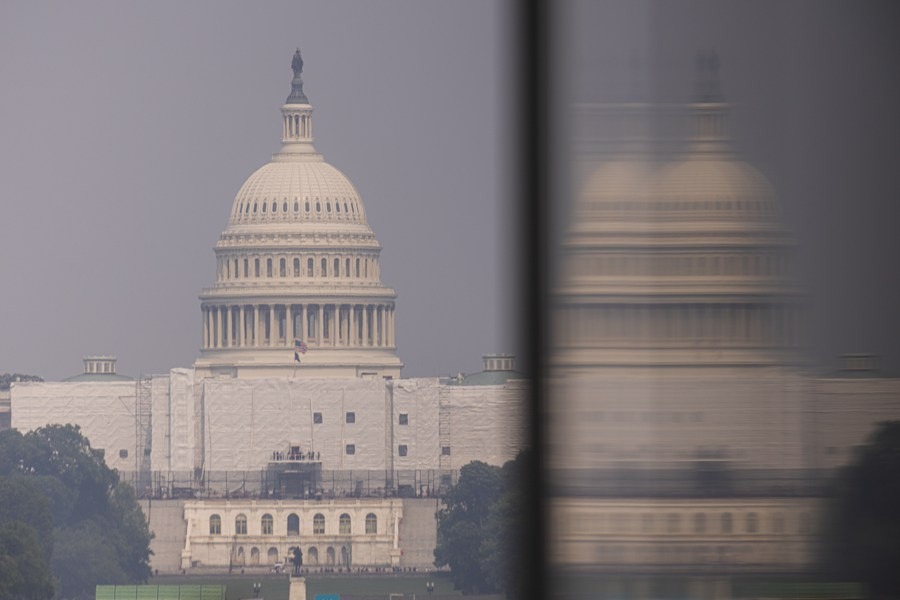Reluctant collaborator


Ukraine crisis has prompted the EU to strengthen its coordination with the US but it is unwilling to totally endorse Washington's competition with Beijing
The protracted Ukraine crisis and the latest escalation of the Israeli-Palestinian conflict are driving a complicated shift in the global geopolitical landscape and shaping the evolution of major country relations. To tackle the two crises, the United States and the European Union have enhanced coordination while still keeping China-related issues high on their agendas. The changing global situation has also prompted the US and the EU to step up their competition with China.
Today, the US and the EU have largely convergent views on China — both regard China as a competitor and challenger. For the US, it has set the long-term goal of outcompeting China, while the EU has moved closer to the US on its China policy and demonstrated a more aggressive stance on China, which will have multiple impacts on China in fronts such as the economy, technology, geopolitical security and ideology.
First, the US and the EU have strengthened their economic bonds and built consensus on "de-risking "from China. Against the background of China's economic and technological development, the US and the EU are trying to "de-risk" from China in trade and economic areas where China can gain access to high technology, while keeping cooperation with China in mutually beneficial fields. Essentially, both "decoupling" and "de-risking" aim to build "a small yard with high fences" that exclude China, with the only difference being that "de-risking" sounds softer and offers more policy space, which will help maximize the benefits.
The alignment of the US and the EU on "de-risking" from China will have a negative impact on the high-quality and sustainable development of the Chinese economy and its technological sector. In terms of economic policy, the US and the EU have been increasingly turning inward and taking a castle-and-moat protectionist approach to reduce their dependence on China. The Joint Communication on European Economic Security Strategy, issued by the European Commission and the EU High Representative for Foreign Affairs on June 20, 2023, is designed to achieve economic security by protecting the EU against economic risks, which will, in effect, bind the hands and feet of EU enterprises.
In this context, China may face subsidies and state interventions from the US and the EU, which will impede China's endeavor to integrate deeply into the global economy. On the technological front, some US and EU enterprises are likely to reduce operations and investments in China to avoid risks, and the tightening technological restrictions imposed on China will hinder the nation's efforts to move up the global value chain.
Second, the closer security partnership between the US and the EU, and their allies in Asia, has complicated the security situation in China's surrounding regions. As the Ukraine crisis drags on into its third year and major power competition escalates, the US has deployed some of its resources and strength to the EU, which, however, has not changed its strategic shift eastward. The US is trying to align its Atlantic strategy with its "Indo-Pacific" strategy, which, coupled with the EU's increasing attention to the "Indo-Pacific" region, is complicating the security situation in the region.
The Ukraine crisis has revitalized NATO, which has gained new-found importance from the conflict. The US is attempting to use "NATO Plus" to link its two alliance systems at the two ends of the Eurasian continent, and peddle the NATO model of "small nations join hands to fight a major power". As NATO pushes for an expansion into the Asia-Pacific, China will encounter more challenges in maintaining stability in its surrounding region and in keeping good relations with neighboring countries due to outside interventions.
In the future, NATO may hold joint military drills targeted against China, and carry out more cooperation with regional countries in the "Indo-Pacific", further worsening China's strategic environment.
Third, the US and the EU have also been smearing China's global image, impeding China's efforts to pursue practical diplomacy. Since Joe Biden became the US president, ideology has taken center stage in the China policy adopted by the US and the EU.Using ideology as a tool to peddle the narrative of "democracy versus authoritarianism", the US and the EU claim to defend the "rules-based international order" by ganging up with other "like-minded countries "such as Australia and Japan to build an anti-China alliance, which will accelerate the forming of blocs and exclusive groups, and exacerbate confrontations and divisions worldwide.
Meanwhile, the US and the EU are weaponizing ideological issues and seeking to build a "democratic alliance of supply chains", a "democratic tech alliance", and an infrastructure-building initiative led by democratic countries in order to reduce the reliance of countries on China, and strengthen the technological blockade against China. The US and the EU have also been interfering in China's domestic affairs regarding Xinjiang, Xizang and Hong Kong by imposing sanctions on China on the grounds of "human rights" issues. The ever-stronger ideological bias the US and the EU hold against China is detrimental to normal diplomatic exchanges.
However, the US and the EU don't see eye-to-eye with each other on every China-related issue. In fact, the EU has different strategic focuses and goals than the US. In contrast with the US, which is the main driver of the breakdown of the current global order, the EU wants to preserve the current system. And since most European countries care more about the transatlantic relations and Russia than the "Indo-Pacific" and China, they don't want to see the US' strategic shift eastward come at the expense of its security commitment made to Europe.
In addition, the US and the EU adopt different stances on China. Whereas the Biden administration regards China as a strategic competitor of the US and uses all tools at its disposal to outcompete China in the long term, the EU has a more multidimensional view of China.
The EU pursues a more balanced strategy toward China rather than absolute decoupling from China. Also, the EU is a supporter of multilateralism, and thus sees China as a key pillar in preserving the international system and a partner in tackling common global challenges. The 24th China-EU Summit has demonstrated the two sides' willingness to enhance communication and trust as an embattled EU seeks to maintain stable and constructive relations with China.
Therefore, the EU will strive to maintain its strategic independence while striking a subtle balance between China and the US.
On its part, China should stay alert to the greater strategic coordination between the US and the EU, while continuing to maintain economic ties and people-to-people exchanges with the US to keep the bilateral relations on a stable path.
In dealing with the EU, China should ensure smooth communication with it on multiple fronts including political, academic and business, and address priority issues of shared concern for the two sides such as economic cooperation and global governance to let China-EU relations play a more constructive role.
Sun Chenghao is a fellow and head of the US-EU Program at the Center for International Security and Strategy at Tsinghua University. Zou Yanning is an editor at World Affairs magazine. The authors contributed this article to China Watch, a think tank powered by China Daily.
The views do not necessarily reflect those of China Daily.
Contact the editor at [email protected].


































